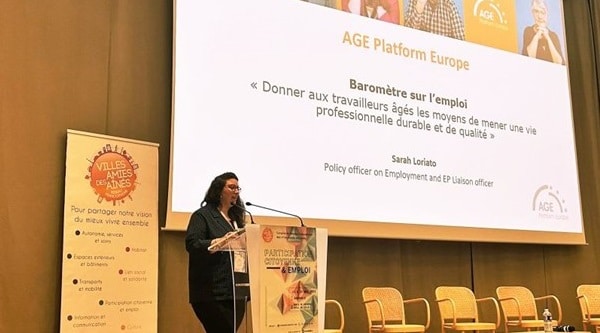
The recent Congress of the French-speaking network of age-friendly cities focused on employment and the empowerment of older people into the labour market. A timely opportunity for us to present the first results of the 2023 edition of our AGE Barometer on “how to empower older people for a sustainable and quality working lives”.

We were invited to participate in the Congress held in Grenoble, France, on 23 May to discuss issues linked to citizen participation of older people and their situation on the labour market, one of our work priorities.
3 areas of action to foster longer working lives
During our presentation, we outlined the three main policy areas highlighted in the forthcoming AGE Barometer:
The first area, support for older people in the labour market, was addressed from the perspective of lifelong career management, protection against redundancy and support for older jobseekers. Among the interesting practices identified by AGE members, the Barometer will highlight the various age equality plans developed in certain sectors in EU Member States.
Secondly, AGE addressed the notion of age discrimination in employment, highlighting the unconscious bias between colleagues, its strong prevalence in recruitment procedures and the state of play regarding the implementation and the limits of the European Council Directive of 27 November 2000 establishing a general framework for equal treatment in employment and occupation.
Finally, AGE presented the various aspects of workplaces for all ages, including working conditions for all, physical and mental health, the impact of digitalisation, and work-life balance.
For each of these areas, AGE members have collected inspiring practices in their respective country, enabling the analysis and development of recommendations that will be at the heart of the Barometer. Some of these were presented to the Congress’ audience, emphasizing the key results of the first analysis, namely the importance of:
- adopting a human-rights and lifelong approach to these issues
- focusing on the individual and his or her skills and expectations.
The participants stressed the importance of EU Member States exchanging information on their respective practices and the impact of employment policies developed at European level.
As soon as it is available, the final version of AGE Barometer and its complete results will be shared with the network.
For more information, you can contact Sarah Loriato, AGE Policy Officer on Employment and Participation and EP Liaison Officer: sarah.loriato@age-platform.eu






